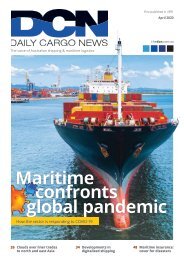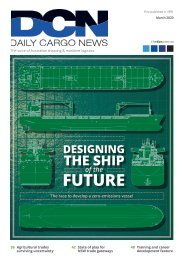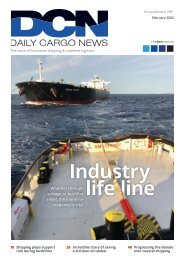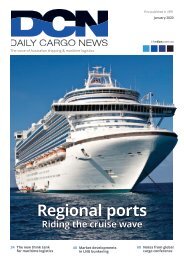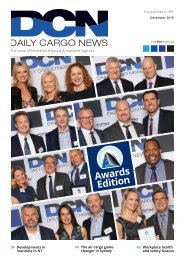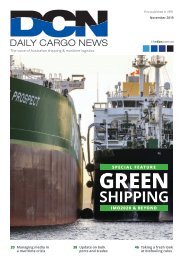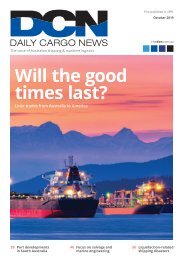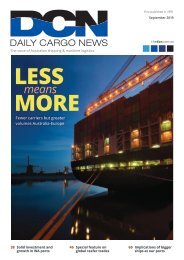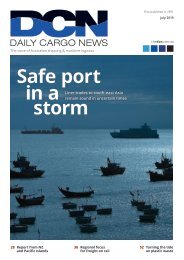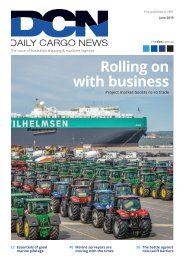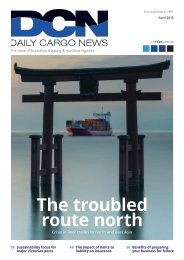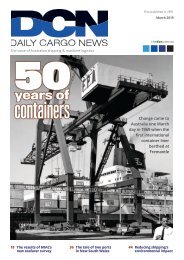DCN May Edition 2019
Create successful ePaper yourself
Turn your PDF publications into a flip-book with our unique Google optimized e-Paper software.
INDUSTRY OPINION<br />
Industry must benefit from<br />
the Biosecurity Imports Levy<br />
Zoran Kostadinoski runs his eye over plans for the Biosecurity Imports Levy<br />
and notes areas for possible improvement<br />
IT HAS BECOME EVIDENT<br />
funding the challenged biosecurity system,<br />
international trade is an easy target for<br />
under the existing cost recovery model.<br />
government agencies to generate revenue<br />
and manage the border and biosecurity<br />
COLLECTION MODEL<br />
systems. This Biosecurity Imports Levy<br />
In any international trade transaction cost<br />
was a recommendation of the 2017<br />
transparency is important and for this<br />
Independent review of the capacity of<br />
reason the CBFCA believes the committee<br />
Australia’s biosecurity system. The levy is<br />
and the minister need to consider the<br />
estimated to raise $325m from <strong>2019</strong>–20<br />
collection model via the existing Full<br />
and was scheduled to start on 1 July <strong>2019</strong>.<br />
Import Declaration, as this is transparent<br />
The government has changed the start date<br />
and prevents the collector adding<br />
to 1 September <strong>2019</strong>. An Industry Steering<br />
additional administration charges on top<br />
Committee, appointed by the minister<br />
of the levy. This is already an acceptable<br />
for agriculture and water resources, is to<br />
practice within the importing community,<br />
consult with industry on the proposed levy<br />
which will ultimately end up paying the<br />
and provide advice to the minister. CBFCA<br />
levy and passing down the supply chain to<br />
representatives recently met with the<br />
consumers. The CBFCA opposes any cross-<br />
committee to discuss the levy design and<br />
subsidisation, as all biosecurity system<br />
further responded with a submission on the<br />
discussion paper released for comment.<br />
users should pay the levy.<br />
Zoran Kostadinoski, regional manager for<br />
Victoria, Tasmania and South Australia, CBFCA<br />
COLLECTION ALTERNATIVES<br />
CBFCA VIEW<br />
If the committee determines the FID is<br />
improvements to frontline biosecurity<br />
The CBFCA’s view is that Australia’s<br />
an unviable collection model, the CBFCA<br />
protection and improved service levels.<br />
biosecurity system must be underpinned<br />
supports collection models that do not<br />
The biggest impact for CBFCA members<br />
by a modern and effective regulatory<br />
involve any commercial operator, as this<br />
and clients is in the imports program.<br />
framework. Currently, biosecurity is<br />
levy will be an impost on operators, and<br />
This is mainly due to the department’s<br />
managed under the Biosecurity Act 2015,<br />
the levy will increase substantially. In the<br />
inability to manage the increased number<br />
and related regulations. The CBFCA notes<br />
case of sea freight it should be levied on<br />
of FIDs submitted by industry for brown<br />
Australia’s biosecurity risks have changed<br />
the port authority based upon containers<br />
marmorated stink bugs’ assessment with<br />
significantly in the last decade.<br />
discharged, passengers and tonnage as the<br />
existing resources and out-dated systems,<br />
The CBFCA understands the biosecurity<br />
ports do now and will include it in the port<br />
resulting in failure to meet current client<br />
system includes pre-border, at-the-border<br />
service charges, which are regulated. The<br />
service standards during the BMSB season.<br />
and post border activities, which need to<br />
same applies to air freight where it could<br />
be funded or cost recovered, in order to<br />
be levied on the airport authority. The levy<br />
FINAL THOUGHTS<br />
reduce the regulatory burden on compliant<br />
then will be collected as an expense to<br />
The CBFCA has made a submission<br />
businesses. The CBFCA hopes increased<br />
operate an international port, airport, or<br />
highlighting these issues to the inspector-<br />
funding will enable the management of<br />
post facility, reducing the risk of any levy<br />
general of biosecurity, Dr Helen Scott-<br />
biosecurity risks in a responsive manner,<br />
increase in a commercial environment.<br />
Orr, who has undertaken an independent<br />
to enhance Australia’s capacity to manage<br />
review - assessment of the effectiveness of<br />
biosecurity risks and ensures Australia<br />
INDUSTRY MUST BENEFIT<br />
biosecurity measures to manage the risks of<br />
remains competitive in international trade.<br />
The CBFCA will continue to advocate<br />
BMSB entering Australia.<br />
that the department ensure effective<br />
The CBFCA looks forward to the findings<br />
THE CONCERN<br />
biosecurity outcomes are delivered without<br />
from the independent review and working<br />
The CBFCA has concerns that funds from<br />
unnecessary impediments to trade.<br />
collectively with all key stakeholders to<br />
the levy will go into consolidated revenue<br />
The CBFCA will also advocate for<br />
ensure that the biosecurity protections<br />
CBFCA<br />
and not allocated to the imports, exports,<br />
and seaports programs, which are currently<br />
government commitment to allocate<br />
significant revenue from the levy to<br />
are met while ensuring the viability of<br />
international trade.<br />
thedcn.com.au <strong>May</strong> <strong>2019</strong> 59



